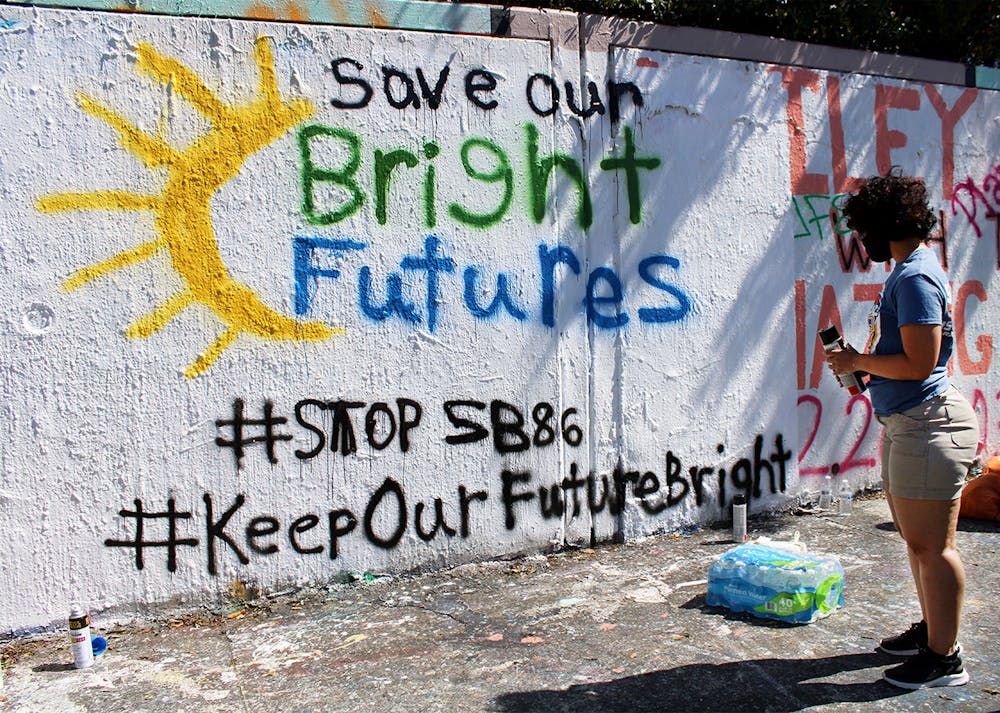Florida State Senators moved forward with a controversial bill that would limit the popular Florida Bright Futures scholarship program Tuesday.
Originally filed by Sen. Dennis Baxley, R-Ocala, Senate Bill 86 proposes changes to the Bright Futures Scholarship program that would limit the amount of money awarded to students based on their chosen major. The bill passed the Senate Education Committee with 5-4 votes.
During the 2019-2020 school year, 25,190 UF students were on Bright Futures, UF spokesperson Cynthia Roldán wrote in an email. Overall, 111,973 Florida students benefited from the program that year.
Gov. Ron DeSantis signaled opposition to the bill Wednesday when he expressed support for the scholarship program during a press conference, saying he believes many Florida families rely on Bright Futures.
“I fully funded it in my budget, and we hope that the Legislature follows suit with that as well,” DeSantis said.
If the bill passes, by Dec. 31, 2021, “the Board of Governors, the State Board of Education and the Independent Colleges and Universities of Florida” must each publish a list of programs that “do not lead directly to employment,” according to the bill. For all 120 credit hours of a program to be covered by Bright Futures, students cannot be enrolled in a major included on the list.
Additionally, students will receive less money based on the number of college credits earned in high school through Advanced Placement, dual enrollment and other means.
Following opposition from students and parents around the state, Baxley published amendments to the bill Monday after its original committee hearing was postponed. The changes would put new features and requirements into place, including an online dashboard and university career planning procedures, according to the bill. But, many of the bill’s key points remain.
During the meeting, Sen. Kathleen Passidomo, R-Naples, said around 70 people — most of whom were students — gathered at the Donald L. Tucker Civic Center, an arena on Florida State University’s campus, to address committee members remotely because of COVID-19 safety procedures. During the public testimony period, senators watched those testifying on a virtual screen.
Students who initially receive scholarship funds for the 2023 to 2024 school year will be affected by the list of programs ineligible for full funding, according to the amendment. However, reduction in student funding based on the number of college credits earned in high school will take effect in the 2022 to 2023 school year.
Current college students would be grandfathered into the proposed bill, meaning they would be exempt from the changes, Baxley said during the meeting.
The bill states the Board of Governors of the State University System must create a public, online dashboard that must be published by Jan. 1, 2022. The dashboard will include data organized by academic discipline about median student loan debt and the post-graduation median salary one, five and 10 years after graduation. It will also state the percentage of graduates whose education continued after earning their bachelor’s degree.
The bill states the intent of the dashboard is to help students and their families make decisions about their education and provide information about future employment opportunities.
The changes also include requirements for state university board of trustees to help students with career planning in their first year of enrollment, such as through a career readiness training module, according to the bill. The plans must be approved by the Board of Governors of the State University System by March 1, 2022.
Two amendments to Baxley’s amendment failed during the meeting, which would have removed the lines about creating a list of ineligible programs and given students a way to appeal for full funding.
“It just doesn’t sound right that you’re going to tell the students what they can and cannot do,” Sen. Perry Thurston Jr., D-Fort Lauderdale, said during the meeting.
Alondra Arce, a 20-year-old UF sustainability and sociology sophomore, said she felt disappointed when she saw the news about the bill passing the committee.
Arce, who previously organized a group of students to paint a mural protesting the bill March 7, said her group’s next goals are to plan an on-campus protest and gain UF’s support after Florida International University’s Student Government Association publicly opposed the bill.
“I really would love if UF also would do something similar to show that they are with us because it’s going to affect us, right, and anything that impacts students is going to impact UF,” Arce said.
Uma McIntosh, a 19-year-old UF history and political science junior, believes the proposed bill is bad for Florida’s overall education system. Bright Futures gives students the opportunity to go to school in Florida who may not be able to afford to otherwise, she said.
Despite the close vote, McIntosh was surprised the Senate Education Committee passed the bill. Scholarships are given to students because they work to get their high school grades, and Bright Futures specifically provides students with the opportunity to go to college, she said.
“I don’t see why the representatives of our community would have passed that knowing how much we value it,” McIntosh said.
Taylor Callaway, a 19-year-old UF nursing freshman, said she didn’t believe the bill would get this far because of its postponement and the backlash it received. Through the extra money provided by Bright Futures, Callaway was able to explore her interests coming into college and make sure she was on the right path, she said.
“People come to college to figure out what they want to do — to pursue a career and path that’s going to make them happy — and they shouldn’t have to determine what that path is because of what the government sees as worthy,” she said.
Although the proposed bill might not affect Callaway, she said receiving more money than those around her because of her nursing major wouldn’t sit right with her on a moral level.
“It’s not just about one person, it’s about everyone,” she said.
The bill will be heard by the Appropriations Subcommittee on Education on March 23.
Contact Juliana Ferrie at jferrie@alligator.org. Follow her on Twitter @juliana_f616.

Juliana Ferrie is a second-year UF journalism student. She is excited to be working for The Alligator as the Santa Fe Beat reporter. In her free time, you can find her reading or listening to music.






